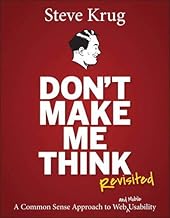
Ten Arguments for Deleting Your Social Media Accounts Right Now
Jaron Lanier
4.5 on Amazon
2 HN comments

Articulating Design Decisions: Communicate with Stakeholders, Keep Your Sanity, and Deliver the Best User Experience
Tom Greever
4.7 on Amazon
2 HN comments

Python for Finance: Mastering Data-Driven Finance
Yves Hilpisch
4.6 on Amazon
2 HN comments

Uncanny Valley: A Memoir
Anna Wiener
4 on Amazon
2 HN comments

The Hacker and the State: Cyber Attacks and the New Normal of Geopolitics
Ben Buchanan
4.5 on Amazon
2 HN comments

Linux Pocket Guide: Essential Commands
Daniel J. Barrett
4.7 on Amazon
2 HN comments

Accounting For Dummies
John A. Tracy
4.4 on Amazon
2 HN comments

Crush It!: Why NOW Is the Time to Cash In on Your Passion
Gary Vaynerchuk and HarperAudio
4.6 on Amazon
2 HN comments

The Revolt of The Public and the Crisis of Authority in the New Millennium
Martin Gurri
4.5 on Amazon
2 HN comments

Making Work Visible: Exposing Time Theft to Optimize Work & flow
Dominica Degrandis, Erin Bennett, et al.
4.6 on Amazon
2 HN comments

Zero Trust Networks: Building Secure Systems in Untrusted Networks
Evan Gilman and Doug Barth
4.7 on Amazon
2 HN comments

Building a StoryBrand: Clarify Your Message So Customers Will Listen
Donald Miller and HarperCollins Leadership
4.7 on Amazon
1 HN comments

Marketing Made Simple: A Step-by-Step StoryBrand Guide for Any Business
Donald Miller, Dr. J.J. Peterson, et al.
4.8 on Amazon
1 HN comments

Deep Learning (Adaptive Computation and Machine Learning series)
Ian Goodfellow , Yoshua Bengio , et al.
4.4 on Amazon
1 HN comments

Don't Make Me Think, Revisited: A Common Sense Approach to Web Usability (3rd Edition) (Voices That Matter)
Steve Krug
4.6 on Amazon
1 HN comments
justinsbonJune 11, 2011
Pyxl101onJan 1, 2015
How difficult is it to keep the right amount of bitcoin and USD in deposit? It seems pretty simple to me. Customer deposits $1.00, then I keep $1.00 in deposit in my business account. Customer deposits 1 bitcoin, I keep one bitcoin. The account for customer deposits will only ever be touched by automated systems processing these transactions.
If I'm charging fees as part of depositing/withdrawing/trading currencies or BTC, then those fees are immediately swept into a separate account, the entirety of which is revenue. Kept strictly separate from deposits. I'd regularly audit both accounts to confirm that the dollar amounts of each deposit/withdrawal, as well as total, match the records of actions in my systems.
Mt Gox only ever handled about 40 trades per second. Seems like you could keep everything balanced with a typical database, using transactions to implement atomic trades / deposits / withdrawals. Perhaps interfacing with money transmission systems is slightly more difficult, but once a transaction has reached the point of having probably-completed, you initiate the transaction to modify the customer's balance of bitcoin and currency.
So I guess I'm agreeing with you that if they failed in this way, they must have been incompetent.
P.S. I'm just making all this up. I've never worked in payments or accounting. I expect a good security or finance auditor could suggest much better controls. I'd pick up an "accounting for dummies" book and learn about the basic control principles used in accounting to prevent fraud. Perhaps I periodically download statements from my bank, print them out (or receive them in the mail) and audit those records against my own systems, by hand. Do the same electronically on a continuous basis. Set up an off-site write-only logging system to capture all transactions, and regularly audit to ensure that the system logs match bank transaction logs.